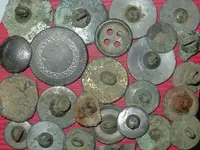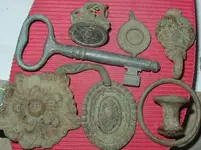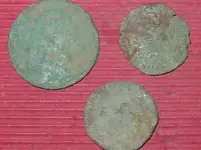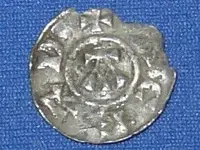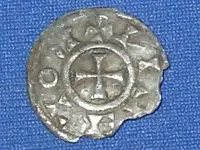CRUSADER
Emerald Member
After gridding for sometime in the bonus field we decided to move on as it had little more to offer.
We didn't need to drive far to spot that a large section of the field we call 'The Hill' had been re-drilled with spring beans. This is the first time we have seen them plough in a large area of failing oil-seed rape & replace it with beans. But it gave us the perfect opportunity. Today was a screaming hot day so we didn't spend long on this field - 30 minutes, but it was enough time for me to fluke out a VIKING Penny.
18th C Fob Seal Matrix
18th C Sword Belt Hanger
Medieval Horse Harness Pendant
Lead Token
Jetton
895-915AD Viking Penny (from East Anglia)- St Edmund Memorial Type;
Even though the Vikings killed the Saxon King (Edmund) through torture, he became a Christian Martyr, & the Vikings who were beginning to convert decided to venerate him on this coin!
They named a City after where he was buried - 'Bury St Edmunds'
Read More:
https://en.wikipedia.org/wiki/Edmund_the_Martyr
We didn't need to drive far to spot that a large section of the field we call 'The Hill' had been re-drilled with spring beans. This is the first time we have seen them plough in a large area of failing oil-seed rape & replace it with beans. But it gave us the perfect opportunity. Today was a screaming hot day so we didn't spend long on this field - 30 minutes, but it was enough time for me to fluke out a VIKING Penny.

18th C Fob Seal Matrix
18th C Sword Belt Hanger
Medieval Horse Harness Pendant
Lead Token
Jetton
895-915AD Viking Penny (from East Anglia)- St Edmund Memorial Type;
Even though the Vikings killed the Saxon King (Edmund) through torture, he became a Christian Martyr, & the Vikings who were beginning to convert decided to venerate him on this coin!
They named a City after where he was buried - 'Bury St Edmunds'
Read More:
https://en.wikipedia.org/wiki/Edmund_the_Martyr
Amazon Forum Fav 👍
Attachments
Last edited:
Upvote
24



